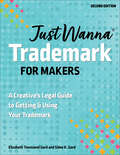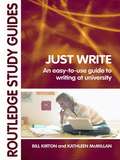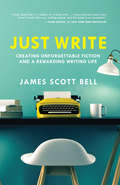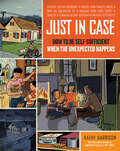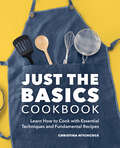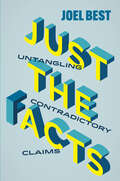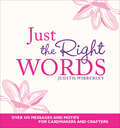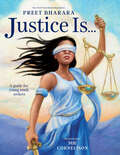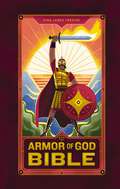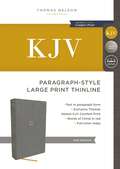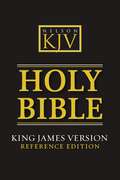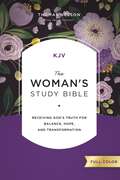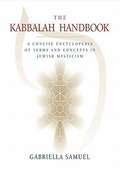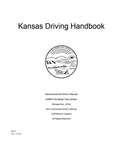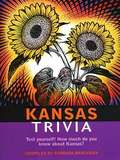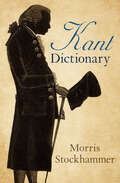- Table View
- List View
Just Wanna Trademark for Makers: A Creative's Legal Guide to Getting & Using Your Trademark
by Elizabeth Townsend Gard Sidne K. GardCreative entrepreneurs and professionals—learn how to boost your chances for securing trademarks for a wide range of arts and crafts. Securing a trademark can be complicated, time-consuming, costly, and all too often unsuccessful. The resources currently on the market are not aimed at creative professionals, leaving them guessing at critical information or wrangling with examples without relatable context. Just Wanna Trademark for Makers offers easy-to-understand legal information created specifically for creative entrepreneurs and professionals. Going beyond the quilt-focused first edition, this newly revised book has updated information, new examples, and cases that show all creative entrepreneurs how to navigate the process of securing a trademark. · Made for makers—All the legal advice is broken down with clear examples so you can proceed confidently · Get expert advice to protect your work and avoid legal pitfalls from experts that understand the art and craft world Learn from real-world examples represented by a wide range of arts and crafts, including quilting, candle making, cosplay, writing, woodworking, and much more
Just Write: An Easy-to-Use Guide to Writing at University
by Bill Kirton Kathleen M McMillanThis is a basic, short guide that helps students make the transition to writing at college or university as simple as possible, providing them with the basic skills they need to write in an effective academic style. The authors draw on their own work to demystify the academic writing process that many students, in all disciplines, find daunting. By understanding exactly what obstacles students face when approaching writing at university they offer proven advice that is simple, uncomplicated and easily achievable. Clear and accessible, this book gives students step-by-step advice to overcome the main hurdles. It covers: overcoming apprehension – then making sure you know exactly what you are supposed to do planning reading – managing your time and keeping your focus, helping you get the material that needs to be in your work getting organised – you are ready to write the first draft, take a break and finally come back and edit it. Jargon-free, the book helps students at all levels of higher education to write clearly and persuasively, expressing both opinions and findings.
Just Write: Creating Unforgettable Fiction and a Rewarding Writing Life
by James Scott BellWriters are given a wealth of opportunities to cultivate a successful writing life, break out, and find an audience for their work. Yet so many writers, from beginners to veterans, find their careers stuck in neutral.The solution is simple: Just write. Write yourself past fears, doubts, and setbacks, and use your desire for writing excellence to deeply immerse yourself in the craft.In Just Write, best-selling author and veteran writing coach James Scott Bell shows you how to develop unforgettable stories while leading a rewarding writing life. You'll learn how to master the nuances of fiction, discover what readers really want, and persevere through the challenges of getting started, conquering writer's block, and dealing with rejection. Look inside to discover how to:BRAINSTORM NEW CONCEPTS for your fiction and develop a believable premise.CREATE MEMORABLE CHARACTERS that keep your readers coming back for more.STUDY CLASSIC & CONTEMPORARY NOVELS to improve your writing.EFFECTIVELY MARKET YOURSELF as a writer.MANAGE YOUR TIME to maintain peak efficiency.Fulfilling writing careers are developed through hard work, an investment in practice, and complete dedication to the process. Don't succumb to excuses or procrastination. Dive into your career with gusto and enthusiasm. Fall in love with writing every day.Just write.
Just a Note to Say . . .
by Florence IsaacsA fully revised edition of Florence Isaacs’s bestselling classic,Just a Note to Say . . . offers over 150 new sample notes and ideas to help you write warm, meaningful messages that let people know how much they matter. For a decade,Just a Note to Say . . . has been an unparalleled resource for choosing the perfect words to express sentiments on any occasion. Brief yet meaningful notes at times of celebration, transition, and sadness are more appreciated than ever. Now, etiquette expert Florence Isaacs updates this bestselling classic with more than 150 new ideas, inspirations, and sample notes to help you stay in touch with friends and family. This fully revised edition confirms that you needn’t write a lot to say a lot, offering practical advice to help you articulate your thoughts and let people know how much they matter. Isaacs explores the significance of occasions such as birthdays, anniversaries, and weddings to help you recognize the recipient’s personal connection to an event. A cornucopia of holidays and rites of passage such as First Communion, Bar and Bat Mitzvahs, La Quinceañera, Christmas, Kwanzaa, and Ramadan are also featured, along with tips to inspire warm notes for these occasions. Isaacs also offers new, thoughtful suggestions for writing during sensitive times such as illness, the death of a loved one, and divorce. Plus, a brand-new chapter on the etiquette of using e-mail tells you when it’s appropriate to share your good wishes electronically. Whether you’re writing an encouraging get-well message or a congratulatory e-mail on a promotion, a sympathy card or an eloquent thank-you note,Just a Note to Say . . . helps you speak from the heart.
Just in Case: How to Be Self-Sufficient When the Unexpected Happens
by Kathy HarrisonIf disaster strikes and public services are limited, you want to know that your family will be taken care of. Learn how to inventory and rotate your food supply, pack an evacuation kit, maintain communication with loved ones, and much more. You’ll soon gain the ingenuity and resourcefulness to get your family through even the most unfortunate circumstances.
Just the Basics Cookbook: Learn How to Cook with Essential Techniques and Fundamental Recipes
by Christina HitchcockBuild your culinary confidence with this essential book of cooking basics!Discover the key ingredients for success in the kitchen this ultimate guide on how to cook a range of hearty, tasty meals—even if you've never cooked anything before. An indispensable reference for new home chefs, this basic cookbook helps you create a well-stocked kitchen and get cooking with 40 staple recipes that are simple and easy to cook.Key cooking techniques—Learn how to cut, mix, and sauté with a rundown of the most important cooking skills, along with tips for reading recipes, preparing your workspace, and more.Flavor profiles—Assemble delicious dishes thanks to a detailed explanation of the five basic tastes and lessons in building balanced flavors and textures.40 meals to get you started—Put your newfound knowledge to the test with everything from Creamy Risotto to Soy Ginger Scallops.Sharpen your basic culinary skills and learn how to prepare tasty meals with the Just the Basics Cookbook.
Just the Facts: Untangling Contradictory Claims
by Joel BestWhy can’t we seem to agree on facts? In this succinct volume, sociologist Joel Best turns his inimitable eye toward the social construction of what we think is true. He evaluates how facts emerge from our social worlds—including our beliefs, values, tastes, and norms—and how they align with those worlds’ standards. He argues that by developing a sociological perspective toward what we think we know, we can better parse the use of facts and untruths around us. This book examines how facts are created and supported through science, government, law, and journalism, revealing that facts are actually claims. These claims are malleable and can change over time through fact-checking, revision, and sometimes rejection. Best guides us through these processes so that we can question our assumptions and understand why disputes happen in the first place. In a time of increasing social and political divide, Just the Facts urges us to resist defensiveness over our facts and approach disputes in critical new ways.
Just the Right Words: Over 400 Messages and Motifs for Cardmakers and Crafters
by Judith WibberleyFind just the right words for your card with this unique collection of original sentiments and verses, plus motifs to add embellishment.From witty and poignant one-liners to inspirational and heart-felt verses, this collection is guaranteed to bring joy to your heart and a smile to your face.In addition, there are also numerous copyright-free motifs sprinkled throughout the occasion-themed chapters to add extra-special embellishment to your cards.Find the right words for any occasion including:BirthdaysAnniversariesChristmasValentine’s DayLove & FriendshipNew HomeWeddingsGraduationsAcross the MilesNew BabySorryThank YouEaster & ReligiousChristeningsMother’s DayFather’s DayGood LuckNew JobGet WellSympathyWhatever you want to say, say it with the help of this charming and entertaining book.
Justice Is...: A Guide for Young Truth Seekers
by Preet BhararaIntroduce the concept of justice to young people with this picture book by New York Times bestselling author of Doing Justice, Preet Bharara.In clear and simple language, Preet Bharara, former U.S. Attorney for the Southern District of New York, explains what justice is and what it takes to achieve it for even the youngest readers. Drawing on examples of historic justice seekers whose deeds best demonstrate those attributes by asking hard questions, keeping an open mind, defending the truth, and using their voices and their bodies to fight injustice—such as Ida B. Wells, John Lewis, Malala Yousafzai, and many others, this timely book is perfect for exploring the concept of justice. Inspire young readers to fight for justice in their world and to remain hopeful that by standing together, it can triumph.
Justine Cooks: Recipes (Mostly Plants) for Finding Your Way in the Kitchen
by Justine DoironNEW YORK TIMES BESTSELLER • Find and refine your cooking style through 110 approachable and innovative plant-forward recipes from popular blogger and social media storyteller Justine Doiron.&“Justine Cooks is like your culinary buddy, encouraging you to try those daring flavor combos or master techniques you thought were out of reach. It&’s an indispensable guide for both seasoned chefs and home cooking enthusiasts alike.&”—Carla Hall, chef personality and author of Carla Hall&’s Soul FoodA BEST COOKBOOK OF THE YEAR: NPR, Today, Food & WineJustine Doiron is known for approachable, inventive cooking that surprises with its unexpected flavor and ingredient pairings, as well as her love of vegetables, beans, bread, and farmers&’ markets. She is also known on social media for her funny, inspiring, validating stories about the ways we connect through food. Here she shares 110 plant-forward recipes for salads, snacks, vegetables, seafood, and tofu plus beans, breads (as well as things to eat on or with bread), and dessert. Recipes include Baked Kale Salad with Chili Quinoa, Breaded Beans with Nutty Skhug, Whitefish Peperonata, and Crispy Rice in Sungold-Miso Broth, plus simple breads like Sweet Potato Focaccia and Ripple Bread. The desserts chapter tempts with recipes like Tiny Salted Tiramisu Cookies and Butternut Squash Cake with Cinnamon Whipped Cream. With tips and techniques as well as kitchen wisdom she&’s picked up on her cooking journey, Justine Cooks is a delicious invitation to explore your own cooking style and creativity.
K-POP A To Z: The Definitive K-Pop Encyclopedia
by Bina LeeEverything You Could Possibly Need to Know about Korean Pop Music! K-POP is popping up everywhere! Korea’s infectious and high-energy pop music and entertainment scene is a relatively young phenomenon in the West, and it is rapidly gaining traction. Don’t be left out of the phenomenon. This book will help you learn the K-Pop lingo, culture, and important facts about the top stars of the industry, including: What it means when someone is your “Bias”Who has the best “Eye-smile” in the industryWhat exactly “Call” meansWhy you should avoid being a “Sasaeng fan”When G-Dragon started training for K-Pop stardomThe meaning behind BTS’s nameWhere Wanna One got their startAnd much more! Impress all your “Koreaboo” friends with the knowledge you gain in K-Pop A to Z!
K-Pop Style: Fashion, Skin-Care, Make-Up, Lifestyle, and More
by Dianne Pineda-KimEverything About the Fashion and Style of Korean Pop Music Step up and join the K-Pop revolution now! K-Pop, Korea’s infectious and high-energy pop music scene, features fashionable and talented singers and eye-popping visuals. Now you too can learn to dress and style yourself just like the top K-pop artists you love! In this beautiful, photo-filled book, you can read about the influence and inspiration behind a variety of K-Pop artists’ clothing and makeup styles from both their street styles and their most popular music videos and concert tours. Study the full-color photos to get the look and street styles of your favorite K-Pop solo artists and groups, both female and male, including: BTSG-Dragon (GD)RainJessica JungEXOCL (Chaerin Lee)BLACKPINKRed VelvetTWICEAnd MANY More!! With K-POP Style, you’ll discover how to achieve the best outfits and makeup styles of your favorite K-Pop performers and turn heads wherever you go!
KJV Armor of God Bible (Children’s Bible, Red Letter, Comfort Print, Holy Bible): King James Version
by Thomas NelsonHelp your child stand firm in their faith and put on the full armor of God!The KJV Armor of God Bible is a guided exploration of the spiritual armor outlined in Ephesians 6:10-18 to prepare a child to understand and live out their faith each day. Perfect for ages 6-10, children will learn the significance of each piece of armor – truth, righteousness, the Gospel of peace, faith, salvation, and the Word of God. Hundreds of call-outs are scattered throughout the Bible to illuminate these essential principles.Devotionals and notes connect each piece of armor by icon to different verses throughout the Bible. In addition, numerous highlighted passages reinforce sharing their faith, encouragement to &“be strong&”, and note where spiritual and physical battles take place. All these features work together for your child to be grounded and find strength in the Word of God.Key features include:52 devotionals relate each piece of the armor of God following a head-heart-hands framework500 notes connect each piece of armor by icon to different verses throughout the BibleBe strong icons highlight verses that use the words &“be strong&”Battle icons highlight verses that have a physical or spiritual battleEvangelism icons highlight verses related to sharing our faithBook Introductions provide an overview and context for each bookIntroductory article with custom artwork gives clarity on how to best use the features in the BibleBible facts infographic and &“The Good News&” article equip children with foundational knowledge about the Bibles structure, themes, and the Gospel message&“I can Pray Scripture&” and &“I Can Memorize Scripture&” articles provide insight into applying these spiritual disciplines to a child&’s lifeReading plans provide guidance on how to read the Bible on a daily basis.Indexes to quickly find each feature found within the BibleKids dictionary and concordance help navigate the meaning and occurrences of terms in the BibleEasy-to-read 9-point KJV Comfort Print®
KJV, Minister's Bible, Ebook
by Thomas NelsonPastors and church leaders stand ready to meet the needs of their flocks. And Thomas Nelson's beautiful and durable KJV Minister’s Bible is here to help. With sermons, readings, outlines, prayers, and more, this Bible is a one-stop resource, offering direction for weddings, funerals, communion and baptism services, confirmations, dedications, and a variety of other pastoral care situations.Features include:Complete text of the timeless King James Version, perfect for all devotional and worship settingsA comprehensive collection of pastoral resources, located between the Testaments--prayers, sermons, outlines, and more
KJV, Paragraph-style Large Print Thinline Bible
by Thomas NelsonThe KJV Paragraph-style Large Print Thinline Bible features the timeless beauty of the trustworthy King James Version Bible. While the traditional design of the King James text starts each verse on its own line, this edition improves the reading experience and comprehension by keeping the writers&’ thoughts together in paragraph format. And with Thomas Nelson&’s exclusive KJV Comfort Print®, you&’ll enjoy typography designed to be exceptionally easy-to-read and honoring the legacy of the King James Version.In 1611 the King James Bible was published and authorized by the monarch of England and Scotland. Today, more than 400 years since its initial publication, the KJV is considered one of the most influential and beautiful works of the English language and continues to be the favorite translation for millions of Christians worldwide.Features include:Clear and readable 10-point KJV Comfort PrintLine-matched double column textBible book introductionsWords of Christ in redOver 22,000 translator notesOver 43,000 cross-referenced passagesConcordanceOne-year Bible Reading PlanThe Parables of Jesus Christ chartThe Miracles of Jesus Christ chart
KJV, Reference Bible, eBook
by Thomas NelsonThis classic King James Version UltraSlim Reference Bible has a wealth of study helps.á Over 60,000 center-column references guide you to related verses for further study and understanding of the Bible, and a concordance enables you to locate key verses and concepts.á Book introductions, explanatory notes, and full-color maps furnish background information to enhance understanding of the Scriptures.á This Bible is a beautifully packaged resource for comfort, wisdom, and inspiration.
KJV, The Woman's Study Bible, Full-Color, Comfort Print: Receiving God's Truth for Balance, Hope, and Transformation
by Thomas NelsonA study Bible with thousands of verse commentary notes designed by women specifically for women to receive God&’s truth for balance, hope, and transformation.The Woman&’s Study Bible poignantly reveals the Word of God to women, inviting them to receive God&’s truth for balance, hope, and transformation. Special features designed to speak to a woman&’s heart appear throughout the Bible text, revealing Scripture-based insights about how godly womanhood grows from a woman&’s identity as a Christ-follower and a child of the kingdom.Now with a beautiful full-color redesign, The Woman&’s Study Bible reflects the contributions of over 80 women from a wide variety of ethnic, denominational, educational, and occupational backgrounds. Since the publication of the first edition of The Woman&’s Study Bible, this landmark study Bible has sold over 2 million copies. Features include: Beautiful full-color design throughout for you to enjoy as you engage ScriptureDetailed biographical portraits allow you to learn from the lives of over 100 women in the BibleThousands of extensive verse-by-verse study notes explain each passage and provide meaning to ScriptureOver 300 in-text topical articles on relevant issues for you to glean wisdom from and apply to your lifeInsightful essays by women who are recognized experts in the fields of theology, biblical studies, archaeology, and philosophy to deepen your theological knowledgeBook introductions and outlines provide an overview and context for each bookHundreds of full-color, in-text maps, charts, timelines, and family trees give a visual representation of Israel and other biblical themesQuotes from godly women throughout history to encourage and guide your faith journeyTopical index and concordance help locate words and show the number of occurrences throughout the BibleClear and readable KJV Comfort Print® typeface in 10.5-point print size
Kabbalah Handbook
by Gabriella SamuelA comprehensive single-volume reference guide to the terms and ideas of Kabbalah by a longtime teacher of Jewish mysticism -perfect for the serious student and newcomer alike. People of all faiths and backgrounds are drawn to the inspiration, knowledge, and spiritual insight that Kabbalah offers. But too often writings on Jewish mysticism are impenetrable for the novice, overly simplified for the advanced student, or misrepresent and sensationalize Kabbalistic practice. The Kabbalah Handbook is the first comprehensive single-volume Kabbalah reference guide that is indispensable for Kabbalah students of every level. The Kabbalah Handbook features: - more than five hundred key terms and concepts in straightforward, easy-to-read definitions and thorough, well-researched discussions; - Hebrew, English, and Hebrew transliteration for each item; - the language of origin for each term; - a discussion of all sides of differing opinions within Kabbalistic philosophy; - pronunciation guides; - nondiscriminatory, gender-neutral language; - important historical information; - extensive cross-referencing that enables readers to find all terms, whether they are looking up a word in English or transliterated Hebrew; - twenty-eight original and innovative illustrations; - thirty-two tables and charts that organize and break down unwieldy material into manageable items; and - appendices covering topics such as the 613 Mitzvot (biblical commandments), the lunar calendar, and the sacred names of God.
Kaiser Permanente Healthwise Handbook
by Donald W. KemperA self-care guide for you and your family, this handbook is a reliable, up-to-date, and easy-to-understand source of help for over 200 medical problems.
Kala Kannada- 3 Hosa Patyakramada Anvaya (Guide): ಕಲಾ ಕನ್ನಡ- 3 ಹೊಸ ಪಠ್ಯಕ್ರಮದ ಅನ್ವಯ (ಮಾರ್ಗದರ್ಶಿ)
by Bangalore Universityಕಲಾ ಕನ್ನಡ- 3 (ಬಿಎ 3ನೇ ಸೆಮಿಸ್ಟರ್ ಯಶಸ್ಸಿಗೆ ಸಿಪಿಸಿ ಕೀ) ಮಾದರಿ ಪ್ರಶ್ನೆ ಮತ್ತು ಉತ್ತರಗಳನ್ನು ಒಳಗೊಂಡಿರುವ ಮಾರ್ಗದರ್ಶಿ.
Kanitha Methai Ramanujan
by Badri SeshadriThis is the biography of the great Indian mathematician Ramanujan who had contributed greatly to the 'Number Theory' and how he achieved great heights like obtaining a Royal society fellowship.
Kannada Viveka (Part-1 & Part-2) SEP Syllabus 2024: ಕನ್ನಡ ವಿವೇಕ (ಭಾಗ- 1 ಮತ್ತು ಭಾಗ- 2) SEP ಪಠ್ಯಕ್ರಮ 2024
by Prof. Nithyananda B Shettyಇದು ತುಮಕೂರು ವಿಶ್ವವಿದ್ಯಾನಿಲಯದ ಬಿಎ 1ನೇ ಮತ್ತು 2ನೇ ಸೆಮ್ ಕನ್ನಡ ಮಾಧ್ಯಮ ವಿದ್ಯಾರ್ಥಿಗಳಿಗೆ ಶೈಕ್ಷಣಿಕ ಪಠ್ಯ ಪುಸ್ತಕವಾಗಿದ್ದು, ರಾಜ್ಯ ಶಿಕ್ಷಣ ನೀತಿ-2024 ಪಠ್ಯಕ್ರಮದ ಆಧಾರದ ಮೇಲೆ ರೂಪಿಸಲಾಗಿದೆ.
Kansas Driving Handbook
by The Kansas Department of Revenue Division of VehiclesThis manual provides information on safe driving rules and practices all drivers should know. This manual does NOT provide information on all aspects of driving. You may have to contact the Kansas Department of Revenue, Division of Vehicles for additional information. Be sure to read the entire manual carefully. You should read and study this manual to help you pass the written test(s) for a Driver’s License.
Kansas Trivia
by Barbara BrackmanKansas Trivia is the who, what, when, where, and how book of the great state of Kansas. Filled with interesting questions and answers about well-known and not-so-well-known facts of this colorful and historic state, Kansas Trivia will provide hours of entertainment and education. Designed for use in a wide variety of settings - home, office, school, parties - it focuses on the history, culture, people, and places of the fascinating Sunflower State.
Kant Dictionary
by Morris StockhammerAn accessible A-to-Z reference guide to the complex works of the eighteenth-century philosopher.A great thinker of the Enlightenment, Immanuel Kant was born in Königsberg, Prussia, in 1724. He rarely left his hometown and never left his country. He did, however, frequently venture into the spiritual and boundless realm of human thinking, from which he brought back his great philosophical works. In the Kant Dictionary, editor Morris Stockhammer brings together essential concepts, terms, meanings, and definitions from Kant&’s vast body of work. The goal was to provide a concise reference tool that penetrates Kant&’s complex system of thought and elucidates his philosophy. Now students and laypeople may have easier access to works once limited to scholars.
